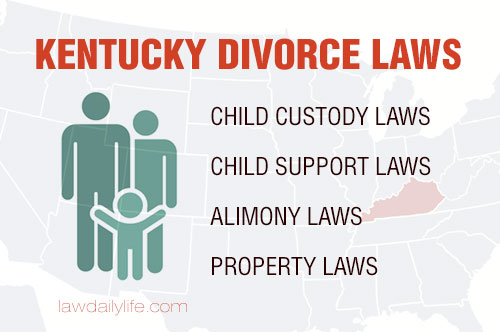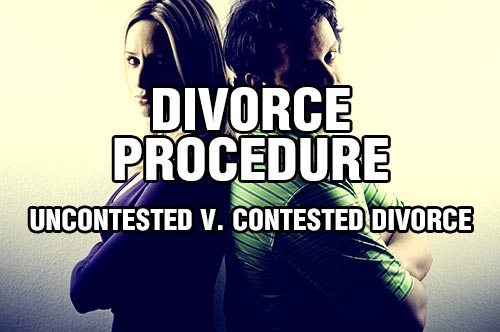The following is a summary of Kentucky’s divorce laws. In some cases, the exact text of the statute has been simplified and/or modified to provide for easier understanding. For a more specific understanding of the laws, you should consult the full Kentucky Code or ask an attorney how the law might apply to your particular situation.

Kentucky Divorce Grounds
What to Expect When Help Yourself Divorce Prepares Your No Fault Kentucky Divorce.
Grounds for Divorce in Kentucky
Help Yourself Divorce is a no-fault divorce service, so if you decide to use our service, your divorce papers will be prepared based on the ground that the marriage is irretrievably broken.
-From Section 403.140 of the Kentucky Statutes
Residency Requirements in Kentucky.
A divorce petition can be filed in the state of Kentucky if at least one party has resided in the state of Kentucky, or was stationed in the state while a member of the armed services, and that residence or military presence has been maintained for 180 days immediately before filing the petition.
-From Section 403.140 of the Kentucky Statutes
Waiting Period Before Divorce is Finalized in Kentucky.
In divorce actions in which there are minor children, no testimony shall be taken or heard before 60 days have elapsed from the date of service. Additionally, no decree shall be entered in any case unless the parties have lived apart for 60 days. Living apart shall include living under the same roof without sexual cohabitation.
-From Section 403.044 and 403.170 of the Kentucky Statutes
Additional Information.
When the wife is pregnant at the time the petition is filed, the court may continue the case until the pregnancy is terminated.
-From Section 403.150 of the Kentucky Statutes
Upon request by a wife whose marriage is dissolved or declared invalid, the court may, and if there are no children of the parties shall, order her maiden name or a former name restored.
-From Section 403.230 of the Kentucky Statutes
Kentucky Alimony Laws
The following is a summary of Kentucky spousal maintenance laws, and is by no means intended to be an all-inclusive description of what to expect in your particular case. In some cases, the exact text of the statute may have been simplified and/or modified to provide for easier understanding. For a more specific understanding of the laws, you should consult the full Kentucky Statutes and/or consult with an attorney about how the law might apply to your particular situation.
Spousal Maintenance (Alimony) Guidelines.
In Kentucky, alimony is referred to as “maintenance”. The court may grant a maintenance order for either spouse only if it finds that the spouse seeking maintenance:
(a) Lacks sufficient property, including marital property apportioned to him, to provide for his reasonable needs; and
(b) Is unable to support himself through appropriate employment or is the custodian of a child whose condition or circumstances make it appropriate that the custodian not be required to seek employment outside the home.
The maintenance order shall be in such amounts and for such periods of time as the court deems just, and after considering all relevant factors including:
(a) The financial resources of the party seeking maintenance, including marital property apportioned to him, and his ability to meet his needs independently, including the extent to which a provision for support of a child living with the party includes a sum for that party as custodian;
(b) The time necessary to acquire sufficient education or training to enable the party seeking maintenance to find appropriate employment;
(c) The standard of living established during the marriage;
(d) The duration of the marriage;
(e) The age, and the physical and emotional condition of the spouse seeking maintenance; and
(f) The ability of the spouse from whom maintenance is sought to meet his needs while meeting those of the spouse seeking maintenance.
However, the court does allow the parties to enter into a separation agreement. In a proceeding for dissolution of marriage or for legal separation, the terms of the separation agreement, except those providing for the custody, support, and visitation of children, are binding upon the court unless it finds, after considering the economic circumstances of the parties and any other relevant evidence produced by the parties, on their own motion or on request of the court, that the separation agreement is unconscionable.
-From Sections 403.200 and 403.180 of the Kentucky Statutes.
Termination of Spousal Maintenance.
Unless otherwise agreed in writing or expressly provided in the decree, the obligation to pay future maintenance is terminated upon the death of either party or the remarriage of the party receiving maintenance.
-From Section 403.250 of the Kentucky Statutes.
Kentucky Child Custody Laws
The following is a summary of Kentucky child custody laws, and is by no means intended to be an all-inclusive description of what to expect in your particular case. In some cases, the exact text of the statute may have been simplified and/or modified to provide for easier understanding. For a more specific understanding of the laws, you should consult the full Kentucky Statutes and/or consult with an attorney about how the law might apply to your particular situation.
Guidelines Used by the Court to Determine Child Custody.
The court shall determine custody in accordance with the best interests of the child, and equal consideration shall be given to each parent. The court shall consider all relevant factors including:
(a) The wishes of the child’s parent or parents, and any de facto custodian, as to his custody;
(b) The wishes of the child as to his custodian;
(c) The interaction and interrelationship of the child with his parent or parents, his siblings, and any other person who may significantly affect the child’s best interests;
(d) The child’s adjustment to his home, school, and community;
(e) The mental and physical health of all individuals involved;
(f) Information, records, and evidence of domestic violence as defined in KRS 403.720;
(g) The extent to which the child has been cared for, nurtured, and supported by any de facto custodian;
(h) The intent of the parent or parents in placing the child with a de facto custodian; and
(i) The circumstances under which the child was placed or allowed to remain in the custody of a de facto custodian, including whether the parent now seeking custody was previously prevented from doing so as a result of domestic violence as defined in KRS 403.720 and whether the child was placed with a de facto custodian to allow the parent now seeking custody to seek employment, work, or attend school.
The court shall not consider conduct of a proposed custodian that does not affect his relationship to the child. If domestic violence and abuse is alleged, the court shall determine the extent to which the domestic violence and abuse has affected the child and the child’s relationship to both parents.
The abandonment of the family residence by a custodial party shall not be considered where said party was physically harmed or was seriously threatened with physical harm by his or her spouse, when such harm or threat of harm was causally related to the abandonment.
-From Section 403.270 of the Kentucky Statutes.
Visitation with Minor Child.
A parent not granted custody of the child is entitled to reasonable visitation rights unless the court finds, after a hearing, that visitation would endanger seriously the child’s physical, mental, moral, or emotional health. Upon request of either party, the court shall issue orders which are specific as to the frequency, timing, duration, conditions, and method of scheduling visitation and which reflect the development age of the child.
If domestic violence and abuse, as defined in KRS 403.720, has been alleged, the court shall, after a hearing, determine the visitation arrangement, if any, which would not endanger seriously the child’s or the custodial parent’s physical, mental, or emotional health.
-From Section 403.320 of the Kentucky Statutes.
Custodian of the Minor Child.
Except as otherwise agreed by the parties in writing at the time of the custody decree, the custodian may determine the child’s upbringing, including his education, health care, and religious training, unless the court after hearing, finds, upon motion by the noncustodial parent, that in the absence of a specific limitation of the custodian’s authority, the child’s physical health would be endangered or his emotional development significantly impaired.
-From Section 403.330 of the Kentucky Statutes.
Kentucky Child Support Laws
The following is a summary of Kentucky child support laws, and is by no means intended to be an all-inclusive description of what to expect in your particular case. In some cases, the exact text of the statute may have been simplified and/or modified to provide for easier understanding. For a more specific understanding of the laws, you should consult the full Kentucky Statutes and/or consult with an attorney about how the law might apply to your particular situation.
Deviation from Child Support Guidelines.
The child support guidelines shall serve as a rebuttable presumption for the establishment or modification of the amount of child support. Courts may deviate from the guidelines where their application would be unjust or inappropriate. Any deviation shall be accompanied by a written finding or specific finding on the record by the court, specifying the reason for the deviation.
A written finding or specific finding on the record that the application of the guidelines would be unjust or inappropriate in a particular case shall be sufficient to rebut the presumption and allow for an appropriate adjustment of the guideline award if based upon one or more of the following criteria:
(a) A child’s extraordinary medical or dental needs;
(b) A child’s extraordinary educational, job training, or special needs;
(c) Either parent’s own extraordinary needs, such as medical expenses;
(d) The independent financial resources, if any, of the child or children;
(e) Combined monthly adjusted parental gross income in excess of the Kentucky child support guidelines;
(f) The parents of the child, having demonstrated knowledge of the amount of child support established by the Kentucky child support guidelines, have agreed to child support different from the guideline amount. However, no such agreement shall be the basis of any deviation if public assistance is being paid on behalf of a child under the provisions of Part D of Title IV of the Federal Social Security Act; and
(g) Any similar factor of an extraordinary nature specifically identified by the court which would make application of the guidelines inappropriate.
“Extraordinary” as used in this section shall be determined by the court in its discretion.
-From Section 403.211 of the Kentucky Statutes.
Child Care and Health Care.
The court shall allocate between the parents, in proportion to their combined monthly adjusted parental gross income, reasonable and necessary child care costs incurred due to employment, job search, or education leading to employment, in addition to the amount ordered under the child support guidelines.
If health care insurance coverage is reasonable and available at the time the request for coverage is made, the court shall allocate between the parents, in proportion to their combined monthly adjusted parental gross income, the cost of health care insurance coverage for the child, in addition to the support ordered under the child support guidelines.
The cost of extraordinary medical expenses shall be allocated between the parties in proportion to their combined monthly adjusted parental gross incomes. “Extraordinary medical expenses” means uninsured expenses in excess of one hundred dollars ($100) per child per calendar year. “Extraordinary medical expenses” includes, but is not limited to, the costs that are reasonably necessary for medical, surgical, dental, orthodontal, optometric, nursing, and hospital services; for professional counseling or psychiatric therapy for diagnosed medical disorders; and for drugs and medical supplies, appliances, laboratory, diagnostic, and therapeutic services.
-From Section 403.211 of the Kentucky Statutes.
Determination of Gross Income.
“Gross income” includes income from any source, except as excluded in this subsection, and includes but is not limited to income from salaries, wages, retirement and pension funds, commissions, bonuses, dividends, severance pay, pensions, interest, trust income, annuities, capital gains, Social Security benefits, workers’ compensation benefits, unemployment insurance benefits, disability insurance benefits, Supplemental Security Income (SSI), gifts, prizes, and alimony or maintenance received. Specifically excluded are benefits received from means-tested public assistance programs, including but not limited to public assistance as defined under Title IV-A of the Federal Social Security Act, and food stamps.
For income from self-employment, rent, royalties, proprietorship of a business, or joint ownership of a partnership or closely held corporation,
“gross income” means gross receipts minus ordinary and necessary expenses required for self-employment or business operation.
-From Section 403.212 of the Kentucky Statutes.
Termination of Child Support Obligation.
Unless otherwise agreed in writing or expressly provided in the decree, provisions for the support of a child shall be terminated by emancipation of the child unless the child is a high school student when he reaches the age of eighteen (18). In cases where the child becomes emancipated because of age, but not due to marriage, while still a high school student, the court-ordered support shall continue while the child is a high school student, but not beyond completion of the school year during which the child reaches the age of nineteen (19) years. Provisions for the support of
the child shall not be terminated by the death of a parent obligated to support the child. If a parent obligated to pay support dies, the amount of support may be modified, revoked, or commuted to a lump-sum payment, to the extent just and appropriate in the circumstances. Emancipation of the child shall not terminate the obligation of child support arrearages that accrued while the child was an unemancipated minor.
-From Section 403.213 of the Kentucky Statutes.
Income Withholding/Wage Assignment Order.
Unless there is good cause shown, all child support orders shall contain a provision for immediate wage assignment.
-From Section 403.215 of the Kentucky Statutes.
Kentucky Property Division Laws
The following is a summary of Kentucky property division laws, and is by no means intended to be an all-inclusive description of what to expect in your particular case. In some cases, the exact text of the statute may have been simplified and/or modified to provide for easier understanding. For a more specific understanding of the laws, you should consult the full Kentucky Statutes and/or consult with an attorney about how the law might apply to your particular situation.
Marital versus Separate Property.
All property acquired by either spouse after the marriage and before a decree of legal separation is presumed to be marital property, regardless of whether title is held individually or by the spouses in some form of co-ownership such as joint tenancy, tenancy in common, tenancy by the entirety, and community property, EXCEPT FOR:
(a) Property acquired by gift, bequest, devise, or descent during the marriage and the income derived therefrom unless there are significant activities of either spouse which contributed to the increase in value of said property and the income earned therefrom;
(b) Property acquired in exchange for property acquired before the marriage or in exchange for property acquired by gift, bequest, devise, or descent;
(c) Property acquired by a spouse after a decree of legal separation;
(d) Property excluded by valid agreement of the parties; and
(e) The increase in value of property acquired before the marriage to the extent that such increase did not result from the efforts of the parties during marriage.
-From Section 403.190 of the Kentucky Statutes.
Guidelines Used by the Court to Determine Property Division.
The court shall assign each spouse’s property to him. It also shall divide the marital property without regard to marital misconduct in just proportions considering all relevant factors including:
(a) Contribution of each spouse to acquisition of the marital property, including contribution of a spouse as homemaker;
(b) Value of the property set apart to each spouse;
(c) Duration of the marriage; and
(d) Economic circumstances of each spouse when the division of property is to become effective, including the desirability of awarding the family home or the right to live therein for reasonable periods to the spouse having custody of any children.
However, the court does allow the parties to enter into a separation agreement. In a proceeding for dissolution of marriage or for legal separation, the terms of the separation agreement, except those providing for the custody, support, and visitation of children, are binding upon the court unless it finds, after considering the economic circumstances of the parties and any other relevant evidence produced by the parties, on their own motion or on request of the court, that the separation agreement is unconscionable.
-From Sections 403.180 and 403.190 of the Kentucky Statutes.









